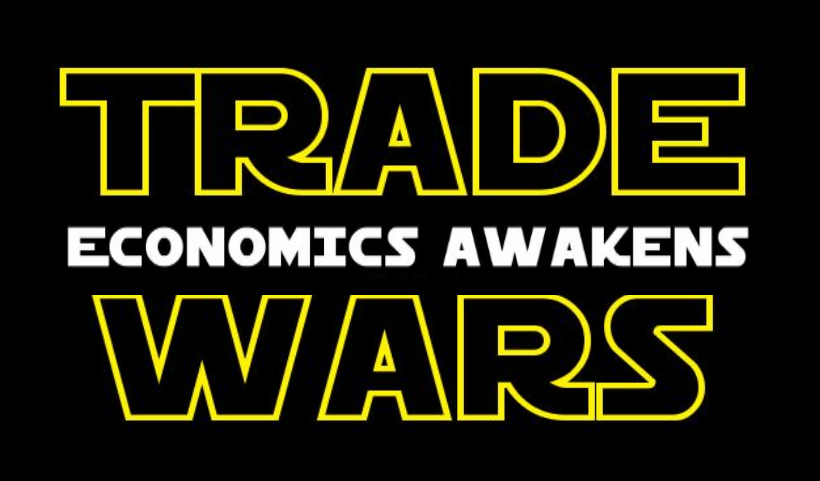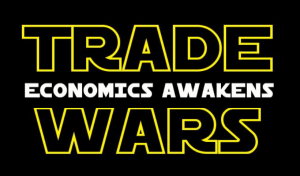Hot Topic: Trade Wars – Economics Awakens

- >
- Uncategorized
- >
- Hot Topic: Trade Wars �…
By: Ninos Malek, May 2018
Use this Hot Topic in the classroom! Teacher Guide
Fundamental Concepts
There are times that when we regret making a deal or we regret spending money on something. This is referred to as ex post regret. However, ex ante (before you decided to trade) you expected to become better off with the trade. Economists assume individuals are rational, which means that they weigh the benefit of the trade and the cost (what is given up) and will only make a trade if the benefit outweighs the cost. In plain English, nobody will make a trade unless they think it’s worth it.Have you ever traded baseball cards or lunch items with a friend? What made you trade? If your friend has done something to irritate you, and you decide to punish him by saying: “This is war! I am not trading with you anymore!” is your friend the only one who will lose? In a war, there are winners and there are losers. We refer to that as a zero-sum game. However, when two individuals voluntarily trade, then both individuals are winning, or the trade would not have taken place. We refer to that as a positive-sum game.
| “Trade wars are good and easy to win.”
~President Donald Trump |
[expand title=”READ ON“]
If you go to the movies and spend $15 to see Avengers: Infinity War, you have traded your money for the movie theater’s service. Did you and the movie theater make an equal trade? When you trade your baseball card for a friend’s baseball card, did you both value the cards equally? The answer is no. A simple example might make this more understandable. If you had a dollar bill, would it make sense for you to go to a friend and say: “Hi there! Do you want to trade your one dollar bill for my one dollar bill?” (Assume the bills are in the same condition). Clearly, this would not make sense since there is no benefit in you both leave wealthier. In other words, you both leave the transaction with something you valued more than when you first walked in. Therefore, economists say that trade creates wealth. Wealth is not just money. When you trade a candy bar from your lunch bag for a friend’s apple, you don’t gain money, but you and your friend are both still wealthier because you each now have something you value more than when you left home for school, and you now both enjoy your lunch even more.
The above examples point out a fundamental fact: individuals trade. When we say, “The USA trades with Canada,” it means Americans trade with Canadians.
| Economic Reasoning Propositions (ERPs) addressed:
1. People choose, and individual choices are the source of social outcomes 2. Choice impose costs; people receive benefits and incur costs when they make decisions 5. Understanding based on knowledge and evidence imparts values to opinions |
Just Because You Are the Best or Just Because You Can Does Not Mean You Should
Trade theory teaches that just because someone is the best at something, that doesn’t mean they should do that something. In addition, just because you can do something, it doesn’t mean you should do it. For example, if Mike is the best goalie on the soccer team, should Mike play goalie? The obvious answer is: “Yes, he should.” However, if Mike plays goalie, there is an opportunity cost—Mike cannot play forward. If Mike also happens to be the best offensive player, then the team is sacrificing his goal scoring while he is playing goalie. In economics jargon, we would say Mike has the absolute advantage in both positions, but since he cannot play both at the same time, the coach must decide where Mike’s comparative advantage is in. Comparative advantage means being able to do something at a lower opportunity cost. In the soccer example, the benefit of Mike playing goalie is that the other team cannot score. The problem is that all the players on Mike’s team have no athletic skill and Mike’s team will never score a goal. Assuming Mike’s team must win the game in regulation play to advance, the coach must ask what is less costly to the team: Mike playing goalie or Mike playing forward? 
The coach thinks to himself: “Joe isn’t as good as Mike, but he’s pretty good. So, I will put Joe in the goal even though he might let one or two get by him because Mike will probably score four goals. I’d rather have a 4-2 win to advance us to the playoffs than a 0-0 tie that will eliminate us.”
In this example, Mike has the comparative advantage in playing forward— it’s less costly to play Mike at forward than it is at goalie.
Economic theory teaches that specialization should be based upon comparative advantage. Is an auto mechanic, who obviously knows how to change his own car oil, being irrational when he takes his car to Jiffy Lube? Not necessarily because, perhaps, he would rather pay with money rather than with his time, which has an opportunity cost. If you know how to mow a lawn but instead hire a landscaper to come every week to mow your lawn, is that being dumb and lazy? Again, not necessarily if you consider opportunity cost. Simply stated, the individuals in these two examples perhaps had better things to do with their time, which was worth more than the money they spent for the oil change or the landscaping service.
Is “Made in USA” Good for the Economy?
If you look at what you are wearing now, from your clothes to your glasses or contact lenses, you are probably wearing products made in two or three different countries. I bet that the United States is not one of those countries. Is it because the United States of America, the world’s largest economy, cannot make shirts, socks, baseball caps, jeans, glass frames, or contact lenses? Of course not.
Even though everything we wear, eat, and use can theoretically have “Made in the USA” on it, should it? Is “Made in the USA” necessarily good for the USA? Does buying something made in China or made in Japan send money to China and Japan and hurt the American economy? Is it better to sell to other countries (export) than to buy from them (import)? Are we “killing American jobs” when we trade with other countries rather than having our fellow Americans making those products? The answer to all these questions lies in looking at the effects on all groups, not just one group.
A trade deficit is when a country imports more than it exports. The word “deficit” has a negative connation; however, when it comes to trade, there is nothing negative about a trade deficit. I have a trade deficit with my grocery store, Starbucks, and the Apple store. I have only purchased from them (i.e., imported) but I have never sold anything (i.e., exported) to them. Am I worse off because I “imported”? I think not. I would much rather purchase items from those who have a cost advantage—a comparative advantage—in providing food, coffee, and electronic products instead of making everything myself. If it doesn’t make sense for me to make everything I enjoy in my life, then why does it make sense for a country to make everything itself? The reality is that when the news headline reads “U.S. has a trade deficit with China” that is the same thing as “China is investing in the United States.” The former sounds negative compared to the latter but it’s two sides of the same coin.
Henry Hazlitt in his famous book Economics in One Lesson writes that most economic fallacies come from looking at the short-term, not the long-term, effects of policies, and from looking at the effects of a policy on one group, not all groups. For example, who does not want foreign wine to enter the United States? The answer is American wine producers. The wine industry’s argument is that this will help “save American jobs.” The fact is that only certain Americans would be better off—domestic wine producers. Moreover, with tariffs (import taxes) and quotas (quantity restrictions), American wine consumers would have to pay higher prices, and their choices would be limited. Another consequence would be that American wine consumers would have to pay more to buy wine (either because of the tariffs or because domestic producers were able to charge higher prices due to less competition), and now those Americans would have less money to spend on other American goods. So, while Americans in the domestic wine industry would be better off, more Americans in other industries would be harmed.
Public Choice Analysis
Public choice is the application of economic principles to political decision-making. There is a concept in public choice economics known as concentrated benefits and dispersed costs, which applies to the wine example. It is easy to see the winners—the concentrated employees in the domestic wine industry. It is harder to see and quantify the losers. Those might be the dispersed millions of consumers who must spend more to buy wine or the dispersed American business owners in other industries, along with their employees, who would lose money and jobs. Since it is easier for special interest groups to get together than millions of consumers, politicians have an incentive to pass legislation favoring the minority at the expense of the majority.
Another example comes from the automotive industry. For example, if someone purchases a Honda Pilot, a “Japanese car,” is that helping the Japanese economy at the expense of the American economy? There are some Americans who believe that buying a Honda vehicle rather than a Ford or GM vehicle is not only unpatriotic, but it hurts American workers.
However, if your Japanese car needs service, you don’t take it to Japan! You take it to the Honda dealership near to where you live in the United States. Moreover, the mechanics at your local Honda dealership are fellow Americans, not Japanese people who commute from Japan every day.
So, while buying a Japanese brand car hurt some Americans, it also helps other Americans—the mechanics and other service employees of Honda, as well as the factory workers in Lincoln, Alabama, where Honda produces Pilots.
Economic analysis forces us to look at the big picture. Individuals in Michigan don’t mind buying oranges from Florida, and individuals in Florida don’t mind buying cars produced in Michigan. If this applies between two states, it also applies when we are discussing two countries. From the American dock workers who unload ships with goods from other countries to the American mechanics who work on imported cars, Americans win from trade.
Is Trade Only Beneficial If It’s Fair?
There are politicians who argue that free trade must be fair trade. So, what about the countries that are not playing fair? What if we allow their products into the United States without tariffs but these countries do not reciprocate?
There are, of course, two ways to look at this. One side argues that the only trade that is good is “fair trade.” This would mean a tit-for-tat strategy. In other words, if China imposes tariffs on us, it’s only fair to impose tariffs on them to not put our industries at a disadvantage. In other words, we need to punish them back into playing fair.
The other side is that if China imposes tariffs on our products or doesn’t allow American products into China, they are hurting themselves. Even though our businesses are denied the Chinese market, it makes no sense to punish American consumers by not allowing them to buy cheap Chinese products. Moreover, if Americans cannot get these cheap Chinese products, Americans will have less to spend at other American businesses.
What if China “dumps” products into the United States? By that I mean, what if a country sells abroad at lower prices than to their own citizens? One argument is that this is unfair trade and it is meant to destroy American businesses. The reason a foreign company can sell at such low prices and not go bankrupt is because their government is subsidizing them. This unfairly puts American companies at a competitive disadvantage.
However, the other side of the argument is that if the Chinese government wants to hurt its own taxpayers (i.e., take money from their citizens and give to Chinese businesses) to give Americans cheaper products, great! This means we do not have to spend as much on Chinese imports, which means there is more money to spend on other American products, or more money to save. Dumping is a gift.
Conclusion
Sound economic analysis involves seeing the effects of a policy on all groups, not just some groups. Public choice economics explains that politicians, both Republican and Democrat, respond to incentives just like any other individual, and the politician’s main incentive is to get votes. Therefore, regardless of economic theory, we should not be surprised when a congressman from a steel producing district votes for tariffs on foreign steel. We should not be surprised when a President imposes tariffs and quotas to gain favor from voters in key industrial states. Public choice does not judge these politicians in the normative sense.
The concept of concentrated benefits, dispersed costs explains why even though there are more winners with free trade that the minority (special interest groups) usually wins the policy argument. If the American wine industry successfully lobbies politicians in Washington D.C. to heavily tax foreign wine, most voters will not know this because they have more important things to do. Public choice economists label this rational ignorance. Getting information incurs an opportunity cost and most voters have much better uses of their time than to watch C-SPAN or to read congressional proceedings. However, the CEOs of wine companies and industry organizations do find it in their self-interest to find out what is going on regarding policies affecting their industry, so they spend millions of dollars lobbying to get their way.
Economists on the left and the right generally agree that voluntary trade leads to mutual gains. While there are individuals who are adversely impacted by international trade, there are more winners than losers. While there are disagreements on specific issues with international trade, most economists believe that beginning a trade war where one country imposes a barrier (i.e., a tariff or quota) followed by the other country retaliating with its own barriers is a dangerous economic policy.
Additional Sources:
https://www.marketwatch.com/story/what-history-teaches-us-about-who-wins-in-trade-wars-2018-03-02
https://www.investopedia.com/terms/s/smoot-hawley-tariff-act.asp
https://www.nytimes.com/2018/03/28/opinion/trump-tariffs-trade-war.html
https://www.marketwatch.com/story/trump-on-tariffs-trade-wars-are-good-and-easy-to-win-2018-03-02
https://www.politico.com/magazine/story/2018/04/07/how-to-win-trade-war-china-217830
https://www.creators.com/read/walter-williams/03/16/trade-deficit-angst
https://www.nytimes.com/2018/03/22/opinion/trade-war-china-trump.html
https://www.huffingtonpost.com/ian-fletcher/free-traders-cant-name-a_b_9409890.html
https://www.nytimes.com/2017/03/02/opinion/what-trump-gets-right-on-trade.html
[/expand]

Welcome: 2020-21 FTE Student Ambassadors
This year, FTE is welcoming thirty-seven student ambassadors who are committed to sharing the economic way of thinking. FTE Ambassadors…

Webinar: The Economic Implications of COVID-19: An Update
On Wednesday, June 10 at 6:00 PM ET/ 3:00 PM PT, Professor Scott Baier, Chair of the Economics Department at…

Webinar: This Is Your Brain On Numbers: Data, Statistics and COVID-19
On Wednesday, May 27 at 3:00 PM PT/ 6:00 PM ET, FTE will present a webinar titled This Is Your…
